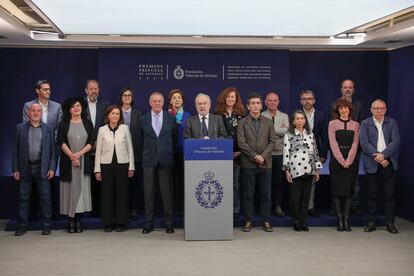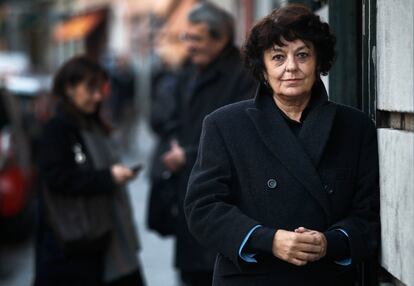When the jury met this Thursday in Oviedo, the Princess of Asturias Award for Literature 2024 was awarded, which went to the Romanian poet Ana Blandiana (Timisoara, 82 years old), an author little known to the general public in Spain but noted by critics. as one of the great voices of European literature and an indispensable figure in the history of resistance to the totalitarian regime of Nicolae Ceausescu. “It is difficult for me to express my emotion and gratitude for the great honor that the awarding of the Princess of Asturias Award represents for me. I can’t help but remember Plato who recommended the crowning of poets with laurels and their expulsion from the city. But, what if for me poetry is really a path to the polis, a way to stay, a way to accompany the suffering of others?!!!”, the poet wrote upon learning of the jury’s ruling. .
Widely translated into Spanish, Blandiana’s verses are collected on the Visor seal (The cricket’s eye, Variations on a given theme, The dream within the dream and other poems, first person plural), the publishing house Pre-textos (The sun beyond and The reflux of the senses) and in Gutenberg Galaxy (A soot-stained archangel). The two volumes of his stories have also appeared on the Periférica imprint (The four Seasons And pprojects of the past). Blandiana’s work and figure follow in the footsteps of the legendary Russian Anna Akhmatova or the Czech playwright Vaclev Hável.
Thank you for the echo that your prestigious award will give to my ideas and my poems and that will amplify them in the consciousness of Spanish readers around the world.
In 1978 the Romanian poet changed her name. Otilia Valeria Coman became Ana Blandiana, since that year her father, an Orthodox priest, was identified as an enemy of the regime. Her early work was banned by her father’s status as a political prisoner, under two different dictators. First Gheorghe Gheorghiu-Dej, then Ceausescu. All of this turned Blandiana’s writings into a clandestine treasure that circulated in manuscripts. The fall of the totalitarian regime in 1989 did not diminish the civic commitment of this author; she reorganized the PEN club in Romania, she chaired the Civic Alliance, an organization that supported the democratic impulse, and created the Memorial of the Victims of Communism and Resistance in Sighet, under the auspices of the Council of Europe. Among many other distinctions, Blandiana received the Legion of Honor in France in 2009 and the European Poet of Freedom award in 2016. “From the adventure of being honored / I return home a winner. / How many generations ago have I been gone? / I don’t remember and I don’t even know where from,” she writes in the first stanza of her poem. Return.
The first thing that reached Blandiana’s Spanish reader in 2008 were her stories, which Viorica Patea, translator of her prose and verse work Patea, places under the influence of magical realism, “by Cortázar, Borges and also Bulgakov.” Her stories offer a panoramic view of the stories of Romania. “Her work has a message and meaning, it is not a mere play on words. She is a kind of Joan of Arc. But Blandiana is a metaphysical poet, not an activist. “She writes about the dignity of the human being, she is not a member of any party,” Patea recalls on the phone. Belonging to the so-called generation of the sixties, from the beginning Blandiana claimed “aesthetics as a subversive gesture”, to stand up to socialist realism, Proletkult that the communist party imposed. “She is an intimate poet with a mystical dimension. She takes up, like other members of her generation, the tradition of the interwar avant-garde that was prohibited by the regime,” explains Patea, and emphasizes that Blandiana was a “forbidden name before it was known.” The translator has worked on Blandiana’s different books in collaboration with other professors and poets such as Natalia Carbajosa, Antonio Colina and Fernando Sánchez Miret, and is currently finalizing The third sacramentthe collection of poems that completes the translation into Spanish of all of the poet’s work and whose publication in Visor is scheduled for 2024.
With a prize of 50,000 euros, the Princess of Asturias Award for Literature is “aimed at the work of cultivating and perfecting literary creation in all its genres,” and is one of the oldest awarded by the Foundation. It was awarded for the first time in 1980 and Carmen Martín-Gaite was the first author to receive it in 1988. Since then, international authors such as Margaret Atwood, Siri Hustvedt, Anne Carson and Fred Vargas have won it. This 2024 has on the list of winners in other categories the Canadian philosopher Michael Ignatieff (Social Sciences), the Iranian cartoonist and filmmaker exiled in France Marjane Satrapi (Communication and Humanities) or the singer-songwriter Joan Manuel Serrat (Arts).

The jury for the 2024 Princess of Asturias Award has been chaired by the director of the Royal Spanish Academy, Santiago Muñoz Machado, and made up, among others, of the novelist Juan Villoro, the bookseller Lola Larumbe, the journalist Blanca Berasátegui, the playwright Juan Mayorga, who received this same award, or the poet Aurora Luque. In the ruling they highlighted that “Ana Blandiana is heir to the most brilliant literary traditions, as well as a radically unique creator.” The award recognizes “the transparency and complexity” of her work, “an untamed poetry.”
Subscribe to continue reading
Read without limits
_

